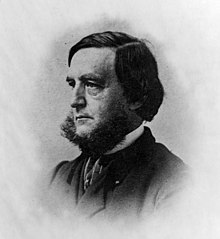Charles Coffin Jewett
Charles Coffin Jewett (born August 12, 1816 in Lebanon , † January 9, 1868 in Boston ) was an American librarian .
From 1848 he was librarian of the Smithsonian Institution and from 1858 superintendent of the Boston Public Library . Jewett was particularly committed to the US public libraries . In 1852 he was the first to introduce the principle of corporate authorship into alphabetical cataloging .
Life
Jewett attended Salem Latin School before going to Dartmouth College and Brown University . He made his first experience in cataloging as a student at Brown University, where he helped to record the collections of the Philermenian Literary Society. In 1837, he entered Andover Theological Seminary , where he helped catalog the seminary's library. In 1841, Jewett became a Brown University librarian. He modernized the library and began to create a library catalog. This comprised two parts: an alphabetical catalog and an alphabetical subject catalog , which were completed two years later.
Jewett then went to Europe for two years to buy and study books. In 1847 he was elected to the American Academy of Arts and Sciences . In 1848 he became Librarian and Assistant Secretary of the Smithsonian Institution, where he collected the catalogs of the major US libraries and wrote a study of the US libraries. At the first Librarian's Convention, Jewett was unanimously elected president in 1853. After conflicts with his supervisor and the Board of Regents regarding the Smithsonian Institution's methods of acquiring his budget, Jewett was fired in 1858 and moved to the Boston Public Library as the new superintendent. He held this position until his death in 1868. He died of a stroke at work.
Boston publisher John P. Jewett was Jewett's brother.
plant
Jewett envisioned a national library that would keep a complete catalog of all US public libraries. The Smithsonian Institution was to take over that role, and Jewett spent years devising guides to accomplish his goal.
As a cataloging theorist, Jewett advocated the alphabetical catalogs, which he found straightforward to create and use. In addition, he opposed mere lists, but advocated additional biographical and bibliographical information. Strict and uniform cataloging rules were the only way to rule out misunderstandings and inaccuracies, even if the usability of the catalogs should suffer from complicated regulations.
In 1852 he was the first to introduce the principle of corporate authorship into alphabetical cataloging.
Works
- Notices of public libraries in the United States of America . Printed by order of Congress, as an appendix to the Fourth annual report of the Board of Regents of the Smithsonian Institution. Washington, Printed for the House of Representatives, 1851
literature
- Moya K. Mason: Historical Development of Ideas Concerning Library Catalogs: Their Purpose and Organization
- Harris, M (editor). (1975). The Age of Jewett: Charles Coffin Jewett and American Librarianship, 1841-1868. Littleton, Colo: Libraries Unlimited, Inc.
Web links
Individual evidence
- ^ Ostrowski, Carl. Books, Maps, and Politics: A Cultural History of the Library of Congress, 1783-1861 , p. 165 (2004)
- ↑ Dietmar Strauch, Margarete Rehm: Lexikon Buch, Bibliothek, neue Medien , 2nd, updated and expanded edition, Saur, Munich 2007, ISBN 978-3-598-11757-2 , p. 250.
| personal data | |
|---|---|
| SURNAME | Jewett, Charles Coffin |
| BRIEF DESCRIPTION | American librarian |
| DATE OF BIRTH | August 12, 1816 |
| PLACE OF BIRTH | Lebanon (Maine) |
| DATE OF DEATH | January 9, 1868 |
| Place of death | Boston |
